Henry Hitchings Quotes & Sayings
Enjoy the top 20 famous quotes, sayings and quotations by Henry Hitchings.
Famous Quotes By Henry Hitchings

In his entry under the verb 'to antedate', Johnson quotes the essayist Jeremy Collier: 'By reading, a man does, as it were, antedate his life, and makes himself contemporary with the ages past.' It is Johnson's engagement with the past and his revival of a diffuse pot-pourri of materials that make the Dictionary such an unexpectedly vibrant work. At — Henry Hitchings
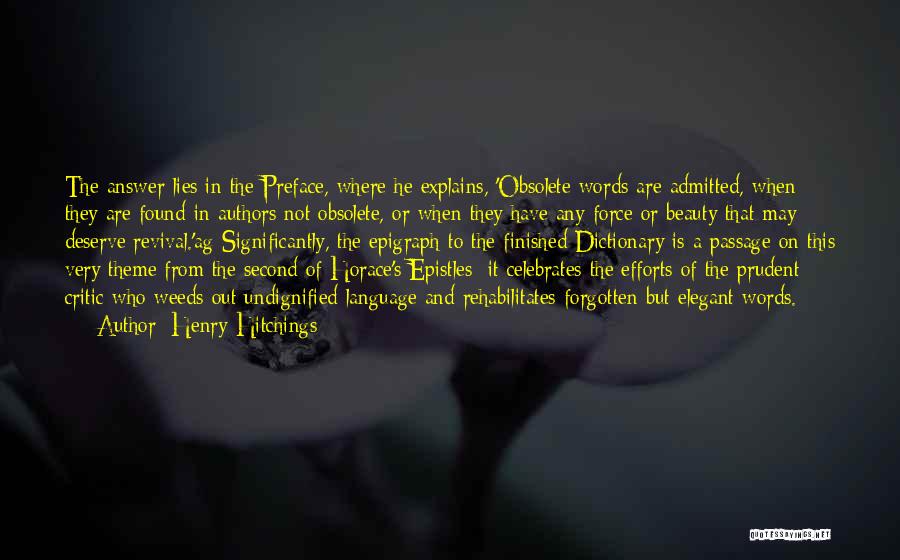
The answer lies in the Preface, where he explains, 'Obsolete words are admitted, when they are found in authors not obsolete, or when they have any force or beauty that may deserve revival.'ag Significantly, the epigraph to the finished Dictionary is a passage on this very theme from the second of Horace's Epistles; it celebrates the efforts of the prudent critic who weeds out undignified language and rehabilitates forgotten but elegant words. — Henry Hitchings

Chinese porcelain was popular, too. The word comes from the Italian for a cowrie shell; literally, porcellana was a 'little pig', and the connection seems grounded in the glossy shell's resemblance either to a pig's back or to a sow's glisteningly crinkled vagina.35 — Henry Hitchings

Memoirs of Martinus Scriblerus (1741), a scurrilous burlesque, written mostly by John Arbuthnot, that poked fun at Grub Street twittishness. He chose this indelicate item because it was a source of interesting words like 'chicanery', 'confidant', 'troglodyte' and 'piazza', and even the distinctly modern-sounding 'skylight'. — Henry Hitchings
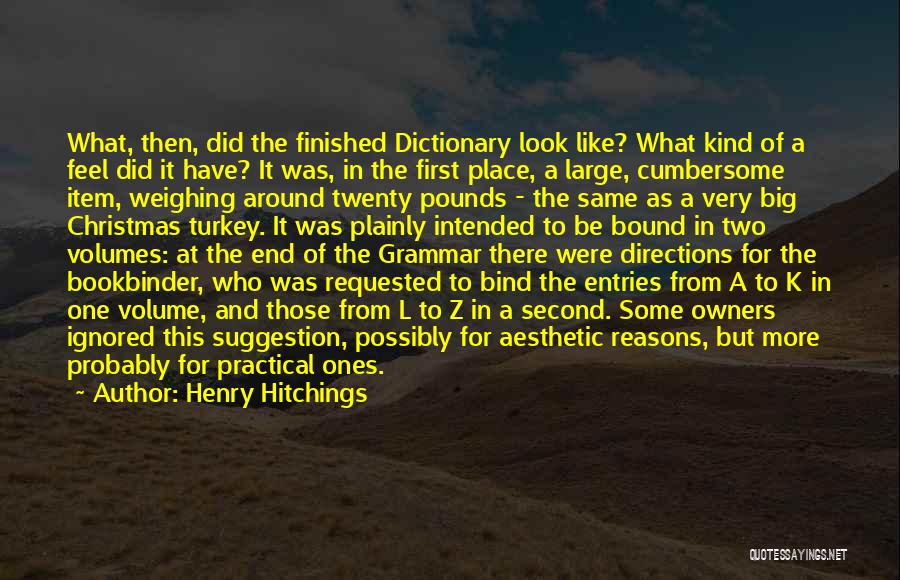
What, then, did the finished Dictionary look like? What kind of a feel did it have? It was, in the first place, a large, cumbersome item, weighing around twenty pounds - the same as a very big Christmas turkey. It was plainly intended to be bound in two volumes: at the end of the Grammar there were directions for the bookbinder, who was requested to bind the entries from A to K in one volume, and those from L to Z in a second. Some owners ignored this suggestion, possibly for aesthetic reasons, but more probably for practical ones. — Henry Hitchings
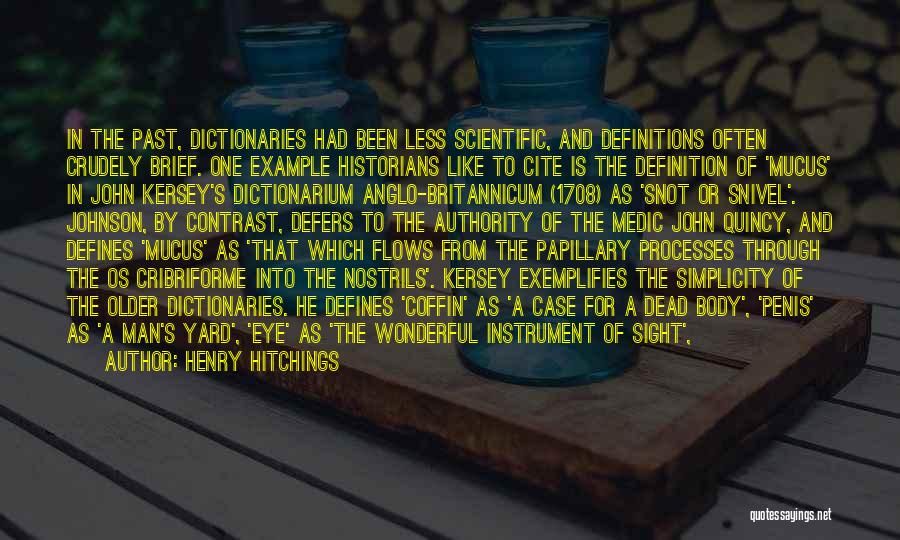
In the past, dictionaries had been less scientific, and definitions often crudely brief. One example historians like to cite is the definition of 'mucus' in John Kersey's Dictionarium Anglo-Britannicum (1708) as 'snot or snivel'. Johnson, by contrast, defers to the authority of the medic John Quincy, and defines 'mucus' as 'that which flows from the papillary processes through the os cribriforme into the nostrils'. Kersey exemplifies the simplicity of the older dictionaries. He defines 'coffin' as 'a case for a dead body', 'penis' as 'a man's yard', 'eye' as 'the wonderful instrument of sight', — Henry Hitchings

Dictionary he identifies 'what ills the scholar's life assail': 'Toil, envy, want, the garret, and the jail'. The last of these was always a genuine possibility: it was common for people owing even modest debts to be incarcerated, and several writers known to Johnson had suffered this fate - the — Henry Hitchings

gloomy, pensive, discontented temper This melancholy flatters, but unmans you; What is it else but penury of soul, A lazy frost, a numbness of the mind? - JOHN DRYDEN AT — Henry Hitchings

Often we have three terms for the same thing--one Anglo-Saxon, one French, and one clearly absorbed from Latin or Greek. The Anglo-Saxon word is typically a neutral one; the French word connotes sophistication; and the Latin or Greek word, learnt from a written text rather than from human contact, is comparatively abstract and conveys a more scientific notion. — Henry Hitchings
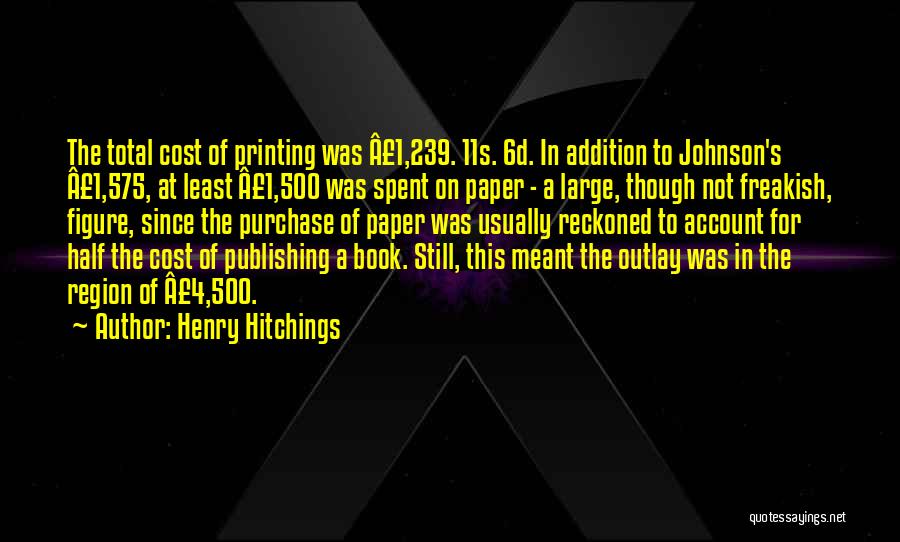
The total cost of printing was £1,239. 11s. 6d. In addition to Johnson's £1,575, at least £1,500 was spent on paper - a large, though not freakish, figure, since the purchase of paper was usually reckoned to account for half the cost of publishing a book. Still, this meant the outlay was in the region of £4,500. — Henry Hitchings

On loof, literally 'on rudder', was a Dutch phrase spoken by the captain of a vessel when he wanted to steer a course away from a hazard such as a reef. It became aloof, a word that extended this idea of avoidance and evasion. — Henry Hitchings

In his eyes Hobbes, who had savaged the Church in Leviathan (1651), was unambiguously wicked, and excluding him was a pleasure. He told his friend Thomas Tyers that he had 'scorned' to quote Hobbes 'because I did not like his principles'.6 Among the texts he did cite, however, was John Bramhall's 1658 Castigations of Mr Hobbes, a book now known, if at all, for having been praised by T. S. Eliot. For — Henry Hitchings

It is the sort of book that has to be rested on a table or a lectern; it is not easy to lift a volume one-handed, and only a basketball player would be able to hold it up and open with a single hand. With its pages spread, it is almost twenty inches wide, and the pages are a foot and half in length; stacked, the four volumes make a pile nearly ten inches high. Johnson's finished tome was stately in appearance - 'Vasta mole superbus' ('Proud in its great bulk'), as he beamingly described it in a letter to Thomas Warton.1 — Henry Hitchings
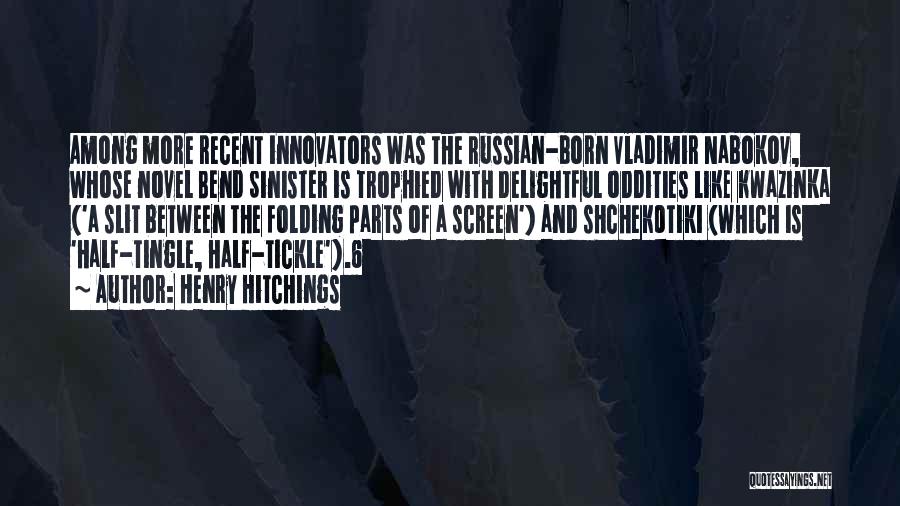
Among more recent innovators was the Russian-born Vladimir Nabokov, whose novel Bend Sinister is trophied with delightful oddities like kwazinka ('a slit between the folding parts of a screen') and shchekotiki (which is 'half-tingle, half-tickle').6 — Henry Hitchings
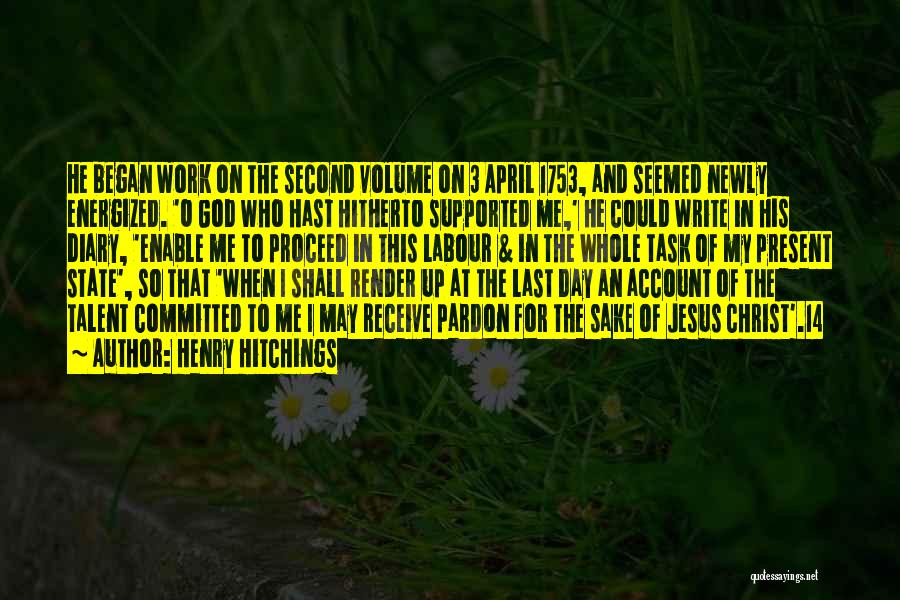
He began work on the second volume on 3 April 1753, and seemed newly energized. 'O God who hast hitherto supported me,' he could write in his diary, 'enable me to proceed in this labour & in the Whole task of my present state', so that 'when I shall render up at the last day an account of the talent committed to me I may receive pardon for the sake of Jesus Christ'.14 — Henry Hitchings
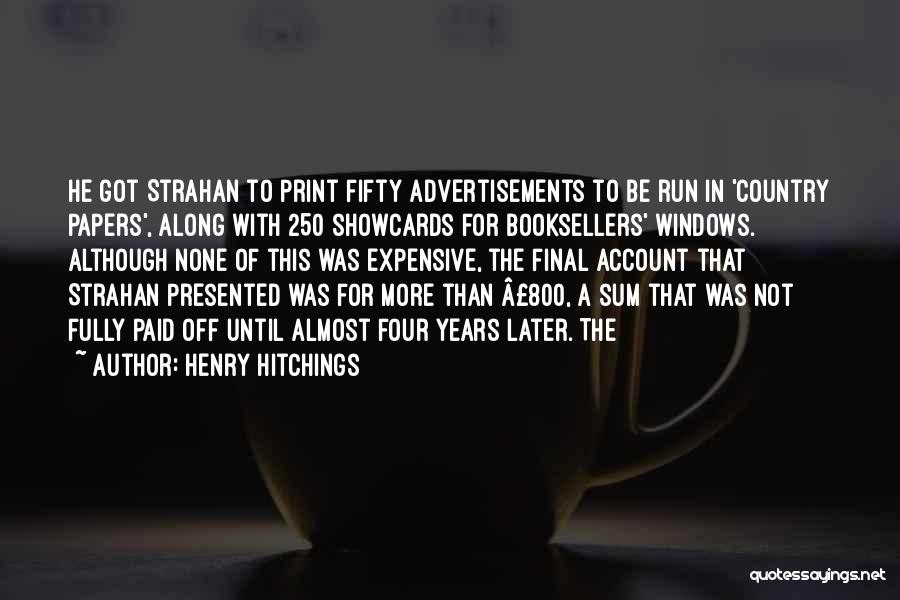
He got Strahan to print fifty advertisements to be run in 'country papers', along with 250 showcards for booksellers' windows. Although none of this was expensive, the final account that Strahan presented was for more than £800, a sum that was not fully paid off until almost four years later. The — Henry Hitchings
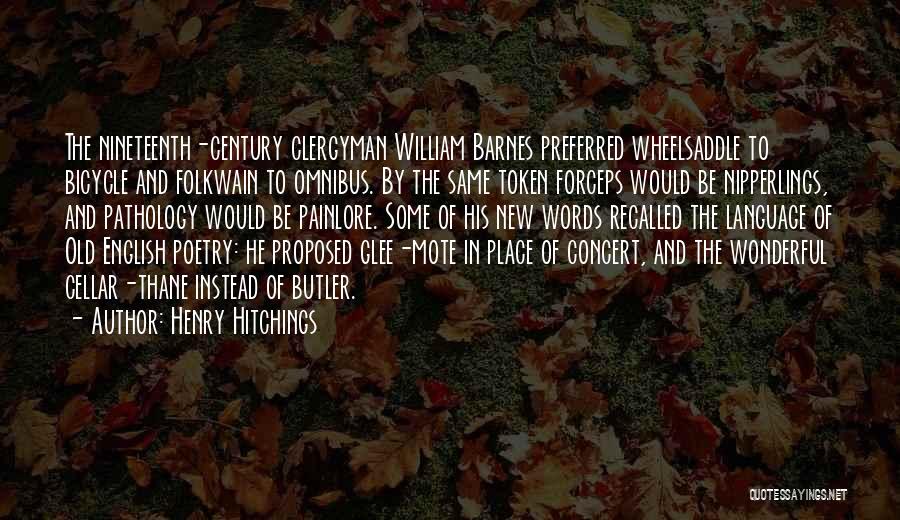
The nineteenth-century clergyman William Barnes preferred wheelsaddle to bicycle and folkwain to omnibus. By the same token forceps would be nipperlings, and pathology would be painlore. Some of his new words recalled the language of Old English poetry: he proposed glee-mote in place of concert, and the wonderful cellar-thane instead of butler. — Henry Hitchings
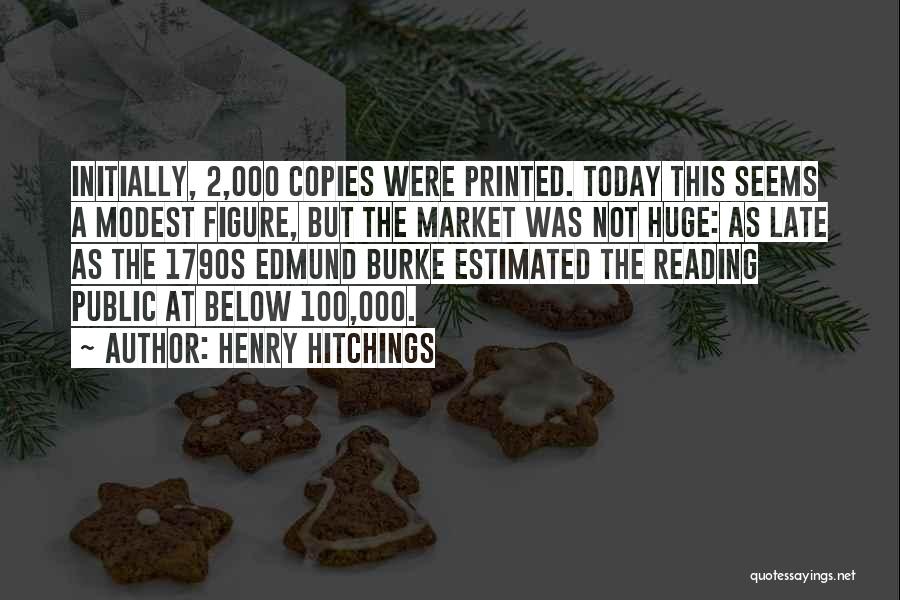
Initially, 2,000 copies were printed. Today this seems a modest figure, but the market was not huge: as late as the 1790s Edmund Burke estimated the reading public at below 100,000. — Henry Hitchings
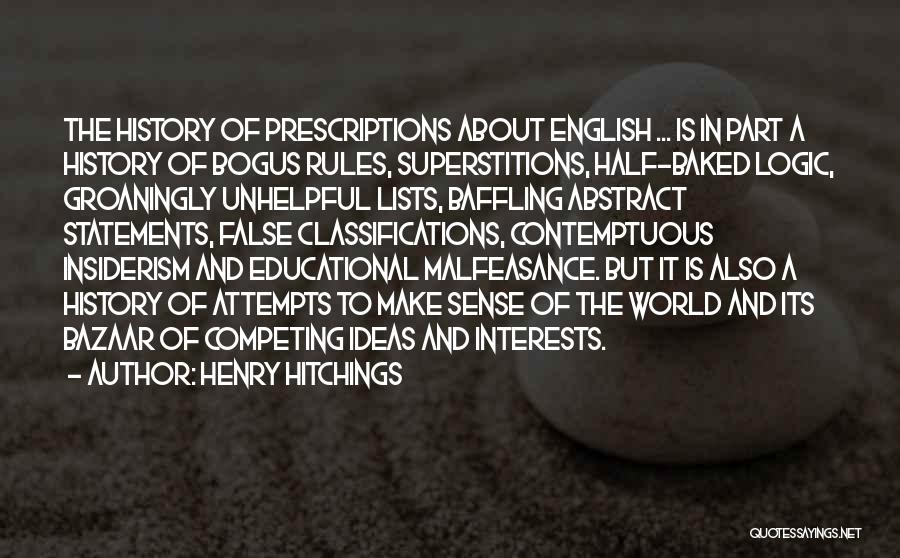
The history of prescriptions about English ... is in part a history of bogus rules, superstitions, half-baked logic, groaningly unhelpful lists, baffling abstract statements, false classifications, contemptuous insiderism and educational malfeasance. But it is also a history of attempts to make sense of the world and its bazaar of competing ideas and interests. — Henry Hitchings






